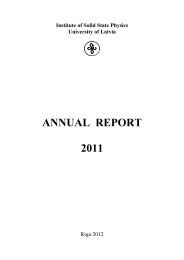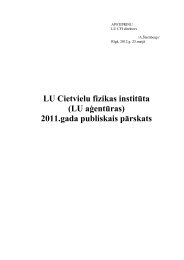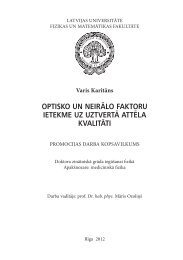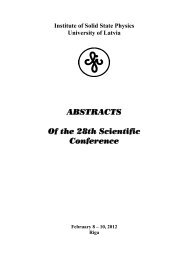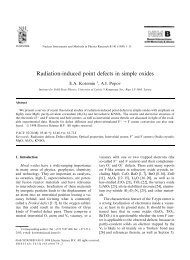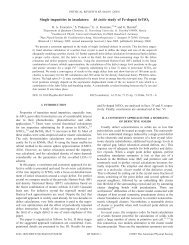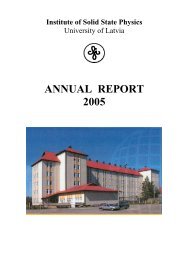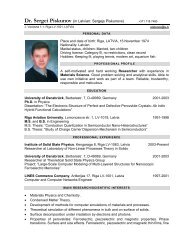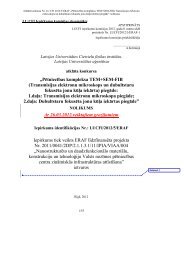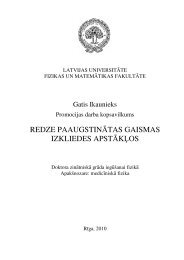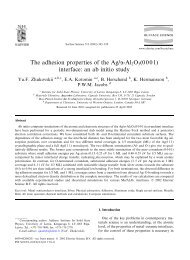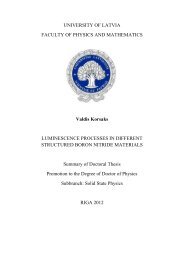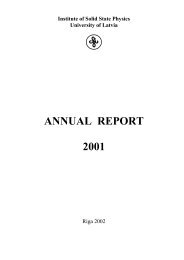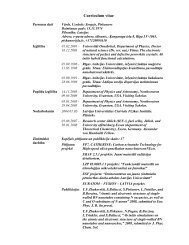Annual Report 2012 - Latvijas Universitātes Cietvielu fizikas institūts
Annual Report 2012 - Latvijas Universitātes Cietvielu fizikas institūts
Annual Report 2012 - Latvijas Universitātes Cietvielu fizikas institūts
You also want an ePaper? Increase the reach of your titles
YUMPU automatically turns print PDFs into web optimized ePapers that Google loves.
LABORATORY OF ORGANIC MATERIALS<br />
Head of laboratory Dr. phys. M.Rutkis<br />
Scientific Staff:<br />
Students:<br />
Mārtiņš Rutkis<br />
Lilita Gerca<br />
Oskars Vilītis<br />
Aivars Vembris<br />
Andrejs Tokmakovs<br />
Jurģis Sīpols<br />
Andrejs Jurģis<br />
Jānis Bussenbergs<br />
Dr.phys.<br />
Dr.chem.<br />
Dr.phys.<br />
Dr.phys.<br />
MSc.<br />
MSc.<br />
Kaspars Pudžs<br />
Raitis Gržibovskis<br />
Eduards Titavs<br />
Mārtiņš Narels<br />
Santa Popova<br />
Zane Kalniņa<br />
Igors Mihailovs<br />
Rolands Usāns<br />
Arturs Bundulis<br />
BSc<br />
BSc<br />
BSc<br />
PhD students:<br />
Elīna Laizāne<br />
Jānis Latvels<br />
Edgars Nitišs<br />
MSc.<br />
MSc.<br />
MSc.<br />
Research aim<br />
The fundamental and applied research of organic molecules, materials and their<br />
structures are conducted by the laboratory. In most cases the objects of investigations are<br />
original organic compounds synthesized by Latvian chemists. The main research goal of<br />
laboratory is to develop knowledge about the structure - properties relationship of<br />
organic materials for next generation electronics and photonics. Based on concepts<br />
derived from these studies, new materials with improved properties are designed in close<br />
cooperation with the Latvian chemists. Assessment and demonstration of possible<br />
applications of the novel developed materials is an important task of the laboratory.<br />
Trained human resources, generated knowledge and technology within the laboratory are<br />
a base for development of organic electronics and photonics in Latvia.<br />
Research topics<br />
• Quantum chemical investigation of structure and properties of chromophores;<br />
• Design of thin films;<br />
• Energy structure of thin films;<br />
• Electrical and photoelectrical properties;<br />
• Nonlinear optical phenomena;<br />
• Stimulated emission;<br />
• Electroluminescence in thin films;<br />
• Optically induced switching;<br />
Research methodology within a laboratory<br />
• Quantum chemical modelling by Gaussian 09, GaussView 5.0 and HyperChem<br />
8.0 software packages;<br />
• Deposition of organic thin films by thermal evaporation in vacuum, spin coating,<br />
blade casting, Langmuir– Blodgett technology, self-assembled monolayers;<br />
• Space charge limited current, time of flight and carrier extraction by linearly<br />
increasing voltage methods are used for acquiring electrical properties of thin<br />
films;<br />
110



